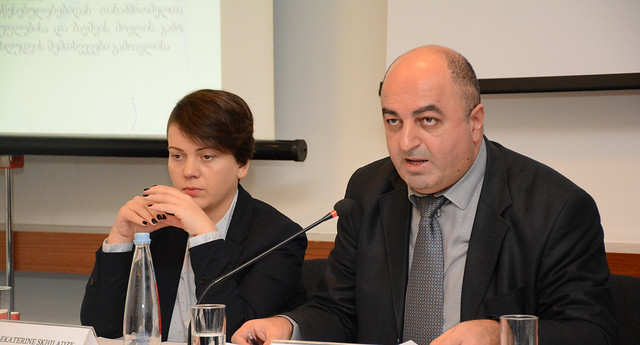Presentation of Public Defender's Report on Situation of Human Rights and Freedom in Georgia in 2017
On December 5, 2017, the Public Defender of Georgia presented a report on the situation of human rights and freedoms in 2017 to representatives of the diplomatic corps, international organizations and civil society. The presentation was held within the framework of the International Human Rights Day that has been celebrated by the civilized world on December 10 since 1948.
"Four years ago, on December 10, 2013, we laid the foundation for the tradition to summarize the situation of human rights and freedoms in the country in December. Today we are presenting this report for the fourth time and I hope that the new Public Defender will continue this tradition," said Ucha Nanuashvili at the opening of the event.
The Public Defender’s report reflects significant achievements and problemsin the field of human rights, resolution of which is necessary in order implement the main principles of the Universal Declaration of Human Rights in Georgia.
One of the most important achievementswas the ratification of the Council of Europe Conventiononpreventingand combating violence against women anddomestic violence(2011), by which the state took a significant step towards improvement of women's rights and gender equality. In addition, the Parliament of Georgia adopted the Law of Georgia on Adoption and Foster Care; standards of early and pre-school upbringing and education were approved as well.
The number of cases of violence on grounds of religious intolerance has decreased this year, though investigations of the cases of previous years are still pending.
The Ministry of Education and Science introduced a bilingual model to promote integration of national minorities; the authorities has not cracked down peaceful demonstrations or used disproportionate force against demonstrators.
However, it should be noted that the situation of human rights andfreedoms has not improved in a number of directions. During fulfilling his constitutional mandate, the Public Defender has repeatedly become an object of attack by high-ranking officials, which turned into an attempt to intentionally discredit the Public Defender’s institution; representatives of the Public Defender had not been provided with information about the whereabouts of the participants of the rally held in front of the Tbilisi City Council for more than 3 hours at the Tbilisi Main Police Division; the State Constitutional Commission did not take into consideration the issues of fundamental importance – establishment of an independent investigative mechanism to investigative the cases of alleged torture and ill-treatment by police officers or an effective state supervisory mechanism to protect labour rights. The number of complaints about ill-treatment by police officers during and/or after detention has increased.
Nocivic mechanism for monitoring security systems has yet been established. Justification of judicial decisions, one of the key elements of a fair trial, remains to be a challenge. Flaws were clearly demonstrated in the Archbishop Giorgi Mamaladze case, the investigation and trial of which were conducted without public control despite high public interest.
6 months have passed since the launch of the investigation, though there still are suspicions that the Georgian state turned a blind eye to or neglected the disappearance of Afgan Mukhtarli. The authorities refused to grant refugee and humanitarian status to Turkish teacher Mustafa EmreÇabuk,who is in the extradition detention and according to the Public Defender, may be subjected to ill-treatment in case of extradition to the Republic of Turkey.
The report includes 31 chapters and concerns almost all problematic areas, like the Public Defender's annual parliamentary report. The document reviews the human rights situation in the penitentiary system, at the bodies subordinated to the Ministry of Internal Affairs and in the field of defense; it emphasizes the need for establishing an independent investigative mechanism and reviews issues, such as ill-treatment, right to privacy, right to a fair trial and the right to integrity of the person.
The report also provides information about thesituation of freedom of religion, the measures taken to protect national minorities and promote civic integration. The document analyzes protection of freedom of expression, freedom of assembly, right to equality and deficiencies in terms of its protection, as well as the situation of property rights, cultural heritage, healthcare, labour rights and the right to live in a healthy atmosphere. Separate chapters are dedicated to the situation of vulnerable groups (children, women, LGBT persons, persons with disabilities, old people).
The document briefly touches upon the situation in terms ofadequate housing and social protection, as well as the rights situation of IDPs, conflict-affected persons, eco-migrants, repatriates, foreigners, asylum seekers, refugees and persons with humanitarian status. The document also includes the results of the monitoring of the local elections held in 2017.
See the electronic version of the report

















